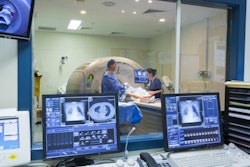Dear MRI Insider,
Radiologists and clinicians are certainly aware of the ongoing debate and voluminous research into gadolinium-based contrast agents (GBCAs) and whether lingering minute traces of the toxic metallic element definitively cause adverse health issues. These concerns have catalyzed researchers to explore alternatives to gadolinium as a contrast material for MRI scans.
To that end, a group of researchers from Massachusetts General Hospital (MGH) is collaborating with Reveal Pharmaceuticals to bring a manganese-based contrast agent (MBCA) to the MR imaging suite. Thus far, preclinical studies have shown the MBCA can achieve equivalent image quality to gadolinium -- and potentially help alleviate concerns surrounding the use of GBCAs.
The details are available in this edition's Insider Exclusive.
Speaking of GBCAs, a meta-analysis by U.S. researchers has found that certain agents could very well be safe for patients undergoing an MRI scan whose stage 4 or 5 chronic kidney disease puts them at risk for nephrogenic systemic fibrosis (NSF). The GBCAs that fall into this category are available in this report.
Elsewhere, Canadian researchers have concluded that two parameters are particularly adept at helping clinicians optimize their use of cardiac MRI to identify which patients with Fabry disease are most at risk for an adverse event.
Reaching out and touching someone can significantly improve compliance with follow-up recommendations contained in musculoskeletal MRI reports, according to a new report from Columbia University Medical Center in New York City. Researchers found that direct contact by radiologists made it more than 25% more likely that referring clinicians would adhere to recommendations, compared with a phone call or email.
Finally, does your teenager drive you crazy? A new study used MRI tools, such as functional MRI (fMRI) and diffusion-weighted imaging (DWI), to shed light on structural pathways in the brain during adolescence, a time of rapid brain development in humans.
Be sure to stay in touch with the MRI Community on AuntMinnie.com on a regular basis for coverage of news and research developments around the globe.



.fFmgij6Hin.png?auto=compress%2Cformat&fit=crop&h=100&q=70&w=100)




.fFmgij6Hin.png?auto=compress%2Cformat&fit=crop&h=167&q=70&w=250)











